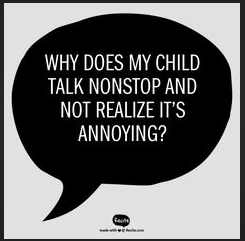October is ADHD Awareness Month. Recognizing and acknowledging ADHD tendencies in our kids, both our own and the ones in our classroom, can be a challenge. But as I become more knowledgeable and do more research on the topic, and listen to family members talk about their experiences, the prevailing reaction to a diagnosis seems to be, "Thank goodness; now I know why I've been feeling that way. Now I know what I am dealing with!"
So here's a short (I hope) compilation of one webinar session from this past month, entitled Having the Talk: How to Best Explain ADHD to Your Child, Family, and Friends. Part Two will share some 'hacks' from another ADHD expert.
Resources and speaker acknowledgement are at the end of the post for further reference.
Thank you in advance for reading!
In past posts I've referred to Executive Functions; those with ADHD have Executive Function developmental delay. These functions are regulated by the prefrontal cortex or operating system of our brain. For kids with ADHD, that operating system is developing at a slower rate than the rest of the brain. Try the analogy of playing with a 2016 version of Minecraft against someone who is using an up-to-date version. The 2016 version is a little glitchy, so it's harder to do certain things that the newer version can do easily.
ADHD makes it:
- harder to do 'future planning' - picturing things that you have to do in the future;
- harder to'feel' time; see The Executive Functions of Time Management;
- harder to use 'episodic memory';
- that is, it's hard to remember how something made us feel in the past; if we could remember doing something that was negative, we might not repeat it.
- harder to do 'perspective taking', which means:
- appreciating what others might be thinking or feeling, as you are talking;
- understanding how you come across to others when you're engaged with them (i.e., it's hard to 'read the room');
- harder to switch from doing something you really like to do to something you don't like;
- harder to be flexible and accept change;
- this is why many teens are resistant to accepting help.
The Brain Coach
All of us have a "Brain Coach" - that little voice inside our brain that is self-directed talk helping us make decisions, plan, and carry out those all-important Executive Functions.
With ADHD, the volume for the Brain Coach is turned down too low, so:- it's harder to pick up the signals that we should be planning for that assignment that's due;
- it's harder to get started on things that are boring or difficult and once started, to stick with them;
- it's harder to figure out what's a little, medium, or big problem;
- kids with ADHD often overreact to what is really a minor problem and not react appropriately to a big problem!
- it's harder to 'see into' the future to predict what might be the outcome of our present actions, even if it's just a few seconds 'down the road'.
Suggestions for what kids with ADHD can say to their peers (or adults who need help understanding):
- "My brain makes it hard for me to picture what I'm supposed to be doing and to pay attention to things I'm not interested in."
- "ADHD makes it hard for me to think about the future before I do something; I'm afraid I'm going to forget something; that's why I call out a lot in class."
- "It's hard for me to remember to do something because ADHD means I can't hear my Brain Coach clearly."
Further thoughts:
- You can't 'speed up' the development of the frontal cortex by being stricter or punishing a child.
- BUT the behaviour is not an excuse; it's an explanation for why a child does things the way he does.
- 30% of kids with ADHD also present with anxiety; boys especially feel they are the only ones feeling like this; it's a huge relief when they realize they are not the only one feeling this way.
Medication
"Medication; it's a band-aid; it won't solve ADHD but it helps to regulate the symptoms. It helps to 'slow you down so you can hear the Brain Coach' ".Quotes from the Webinar
- ADHD is a description of how your brain works; it is not your identity.
- ADHD is not a character flaw.
- Denying ADHD exists could very likely impair your relationship with your child.
- When we were growing up, ADHD was rarely diagnosed. If it was diagnosed it was rarely talked about or explained to kids beyond "trouble paying attention or sitting still."
My Thoughts
Many parents do not wish to acknowledge that a child might 'have' ADHD because it means giving them 'a label'. My response is that that label can bring a wealth of comfort, a huge sense of relief, and access to valuable resources and support.Finally, a disclaimer. I'm trying to become as knowledgeable as I can about this topic, but I am a teacher, not a social worker or a therapist. I'm sharing resources that I have found to be both helpful and reliable.
The Resources
- Ryan Wexelblatt, LCSW (Licensed Clinical Social Worker) was the presenter of this webinar, as presented on https://www.additudemag.com/
- Ryan specializes in working with males from 5 - 22 who present with ADHD, anxiety with ADHD, and learning differences.
- Ryan has a YouTube channel with some specifically directed to fathers.
- He also has a ADHD Dude Facebook group.
- CHADD (Children and Adults with Attention-Deficit/Hyperactivity Disorder)
- Try Totally ADD for a Canadian and humourous take on ADHD. You might recognize Rick Green, the founder of Totally ADD, as one of the writers for the Red Green show (which just might be dating me!). I particularly encourage you to read the About Us page to put a human face on ADHD.








